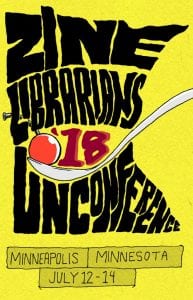Matthew Collins, Reference, Instruction and Zine Librarian, attended the Zine  Librarians UnConference, (ZLuC) in Minneapolis, Minnesota.
Librarians UnConference, (ZLuC) in Minneapolis, Minnesota.
After starting the Gleeson Zine Library with Anders Lyon in 2017, Matt saw the conference as an opportunity to discover ways to improve the collection and engage with the university community. The zine collection will be primarily focused on social justice issues with plans for open workshops in addition to working with Faculty and their classes to encourage contributions.
Inspired by some of the ideas from the conference, he incorporated them into the next zine event. According to Matt, “Anders and I led two classes of Muscat Scholars in a Zine making project. Ahead of time the students were asked to think about aspects of their identity and that topics portrayal in the media. However, once we started making the zines the content restrictions were lifted. They could zine about anything. We got everything from very personal zines about the individuals likes and dislikes, to zines about the students culture and negative stereotyping, to zines about interesting facts about random animals. But having done the reflection everyone could participate in the small group discussions. We talked about the concept of authority, how it is constructed and how it might change in different contexts. We also talked to the about bias in the media and other institutional bias. ”
Due to the unique nature of zines, Matt utilized the “Zine Librarians Code of Ethics Zine” to write the Gleeson Zine Library acceptance form when acquiring zines to add to the library collection. If you have any questions about the zine collection or zines in general, you are welcome to contact him.
